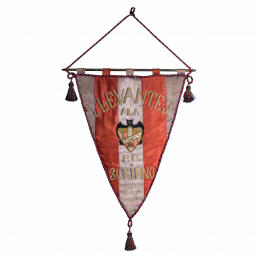On Sunday 30 March 1952, Levante travelled to Alberique to face a match against La Peña Soriano (2-3). It was not a match in the official calendar. It was a friendly match that the Blue and Whites took advantage of to prepare for the match against Melilla the following weekend. It was a fundamental game in the fight to stay in the Silver Division. There was no football in the Second Division on that last Sunday in March. The pennant depicts that new-look clash between two teams with no notches on their respective sporting records. It is a donation made by Vicente Grima. La Peña Soriano, founded in the second half of the forties, competed in the Third Division.
However, the match takes on a new tonality if you frame it in the context of the present, which brings the action back to the middle of the 20th century. There was activity around Levante, mainly in reference to the state of the club’s leadership. During that week that expired with the trial in Alberique, Antonio Román capitalised on the attention of the local media. Román took over the presidency of Levante in a dramatic context. The economic and sporting problems, linked together, created a climate of uncertainty. Antonio Román was not alone in this adventure. Melchor Gallart, president, Vicente Guillem, treasurer, Luis Foix, accountant, José Pérez Soriano, secretary, and Ramón Martí Botella, as vice-secretary, made up the board of directors, as reported in the Diario Jornada on Thursday 27 March 1952.
That duel in Alberique was one of Antonio Román’s first public statements as Levante manager. “I come to work with enthusiasm and to lift the club. We are all willing to achieve this in exchange for whatever it takes. This is about sacrifice, enthusiasm and work”, he stressed in the Valencia evening newspaper Diario vespertino. The hierarch would shape almost the entirety of the story that comprised the decade of the 1950s. It was a crucial moment in the history of Levante with the assumption of the purchase of the Vallejo Stadium. In the second half of the sixties, he returned to the presidency to undertake the construction of the current Ciutat de Valéncia.
Levante beat their opponents thanks to goals from Escrivá, Corberán and Pauet in the second half. Granell and Agramunt were the scorers for the home side. Levante fielded, on a trial basis, several players who came from the ranks of Ducal, Vallejo’s club’s subsidiary. That match revolved around the duel that the following week would pit the azulgrana team against Melilla. It was a match with the flavour of a final in the battle for survival in the world of the Silver Division. Levante did not achieve permanence at the end of the 1951-1952 season. The reduction of the Second Division meant that sixteen of the thirty-two participating teams were forced to compete in the Third Division.
